
- Philip Polkinghorne was found not guilty of murdering his wife Pauline Hanna after a two-day jury deliberation.
- Criminal defence lawyers Roderick Mulgan and Elizabeth Hall praised the verdict as an example of the justice system working.
- Mulgan noted a Coroner may find Hanna didn’t commit suicide, but a Coroner’s inquest is not a criminal inquiry.
Following the trial that gripped the nation a criminal defence lawyer says the Polkinghorne trial is an example of the criminal justice system working.
The jury found eye surgeon Philip Polkinghorne not guilty of the murder or manslaughter of his wife Pauline Hanna at their Remuera home in April 2021.
The verdict was returned yesterday afternoon following 10 hours of deliberations that stretched over two days.
For eight weeks the jurors listened intently to evidence from the Crown which alleged Polkinghorne murdered his 63-year-old wife Pauline Hanna at their home in Remuera and arguments from the defence which claimed she took her own life.
Criminal defence lawyer Roderick Mulgan told Newstalk ZB that he wasn’t surprised by the verdict because of the significant doubt present.
 Philip Polkinghorne leaves Auckland High Court with sister Ruth Hughes after being found not guilty of murdering his wife Pauline Hanna. Photo / Dean Purcell
Philip Polkinghorne leaves Auckland High Court with sister Ruth Hughes after being found not guilty of murdering his wife Pauline Hanna. Photo / Dean Purcell
“I think many people saw that coming.
- Watch: ‘**** off’: Polkinghorne and sister shun questions as they arrive home after verdict
- Sex, drugs and despair: Inside the Polkinghorne murder trial, which gripped the nation
- ‘Let Pauline rest in peace’: Polkinghorne not guilty of murdering wife
“If there is doubt, you’ve got to have an acquittal, even though many people were suspicious it was just not enough. It is a high bar.”
Mulgan said it is difficult to convict people on circumstantial evidence.
“Judges say to juries all the time, even if you think it is likely somebody did it that’s not enough to be sure.”
 Roderick Mulgan. Photo / Supplied
Roderick Mulgan. Photo / Supplied
What if the Coroner says Pauline Hanna’s death was not suicide?
Mulgan said the Coroner has a different standard of evidence and a Coroner’s inquiry is a balance of probabilities of what’s more likely.
He says a Coroner’s conclusion is not a criminal enquiry.
“The Coroner is free to come to a different conclusion if they think the evidence merits it.”
He said you can have the jury claiming doubt and the Coroner saying it’s likely to be murder and “those two things can sit side by side”.
Mulgan said a retrial is very unlikely because “a re-trial is big and it’s complex”.
A new trial could only happen if there was substantial new evidence.
“It just doesn’t exist, everything here is circumstantial.
“There was never an eye witness, there was never a photograph, there was never a fingerprint.”
Mulgan said he believed a retrial was not going to happen and Polkinghorne was likely a free man for good.
 Defence lawyer Elizabeth Hall. Photo / Supplied
Defence lawyer Elizabeth Hall. Photo / Supplied
Criminal defence lawyer Elizabeth Hall told Newstalk ZB’s Mike Hosking that the verdict was a prime example of our criminal justice system working and that it is encouraging for all defence lawyers to see.
When asked how much weight she would put on Madison Ashton’s non-appearance, Hall said the jury wasn’t missing anything.
“Come on Mike, everything that woman has to say was already before the jury.
“The only thing that the jury missed out on was seeing what that outfit that woman wore to court.”
Hall said she thought it was a red herring to focus on what Ashton might have added to the trial.
She said she didn’t think the trial gripped the nation, “I think it has gripped those people who like clickbait on media, it’s just justice working.”
Both the Crown and defence have worked very hard, the verdict is what it is, and New Zealanders need to see that it’s justice working, Hall said.
Take your Radio, Podcasts and Music with you









